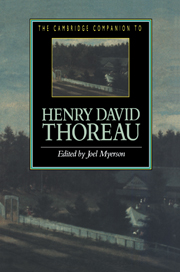Book contents
- Frontmatter
- 1 Thoreau’s reputation
- 2 Thoreau and Concord
- 3 Thoreau and Emerson
- 4 A Week on the Concord and Merrimack Rivers
- 5 Thoreau as poet
- 6 Thoreau and his audience
- 7 Walden
- 8 Thoreau in his Journal
- 9 The Maine Woods
- 10 A wild, rank place
- 11 Thoreau’s later natural history writings
- 12 Thoreau and the natural environment
- 13 Thoreau and reform
- Further reading
- Index
- Series List
7 - Walden
Published online by Cambridge University Press: 28 May 2006
- Frontmatter
- 1 Thoreau’s reputation
- 2 Thoreau and Concord
- 3 Thoreau and Emerson
- 4 A Week on the Concord and Merrimack Rivers
- 5 Thoreau as poet
- 6 Thoreau and his audience
- 7 Walden
- 8 Thoreau in his Journal
- 9 The Maine Woods
- 10 A wild, rank place
- 11 Thoreau’s later natural history writings
- 12 Thoreau and the natural environment
- 13 Thoreau and reform
- Further reading
- Index
- Series List
Summary
In Walden Thoreau writes of the traveler approaching a swamp who asked a boy if the swamp was passable, if it “had a hard bottom. ” The boy, Thoreau says, “replied that it had. But presently the traveller’s horse sank in up to the girths, and he observed to the boy, 'I thought you said that this bog had a hard bottom.' ’so it has,' answered the latter, 'but you have not got half way to it yet' “ (W 330).
So it is with Walden itself. Most readers approach Walden assuming that they will find the “hard bottom ” of its truth in the popular cultural myth of Thoreau as the hermit sitting meditatively by Walden Pond. It is a myth of retreat, a myth of a return to Eden, a myth of stasis, and it is a very appealing myth to a postindustrial society faced with overwhelming change. That myth is in Walden, to be sure, but the alert reader will find that it does not take him or her any more than halfway to the full significance of the book. A closer reading of Walden reveals a Thoreau who is often less interested in stasis than in change, less interested in meditation than in a journey of exploration.
Thoreau’s own journey in Walden took him physically no farther than Walden Pond, a mile and a half outside Concord. The plan to live alone by a pond had been on his mind for years. In 1837 during the summer after his senior year at Harvard, he lived in a bachelor cabin with his friend Charles Stearns Wheeler (Harding 49). As early as 1841 he wrote in his Journal of building his own cabin by a pond (Sandy Pond, at first): "I want to go soon and live away by the pond… . But my friends ask what I will do when I get there? Will it not be employment enough to watch the progress of the seasons?" ( PJ 1:347). His first published essay, "Natural History of Massachusetts" (1842), had indicated his interest in studying and writing about nature. Living by a pond would be convenient for the nature study, which might lead to other publishable essays.
- Type
- Chapter
- Information
- The Cambridge Companion to Henry David Thoreau , pp. 92 - 106Publisher: Cambridge University PressPrint publication year: 1995
- 4
- Cited by

